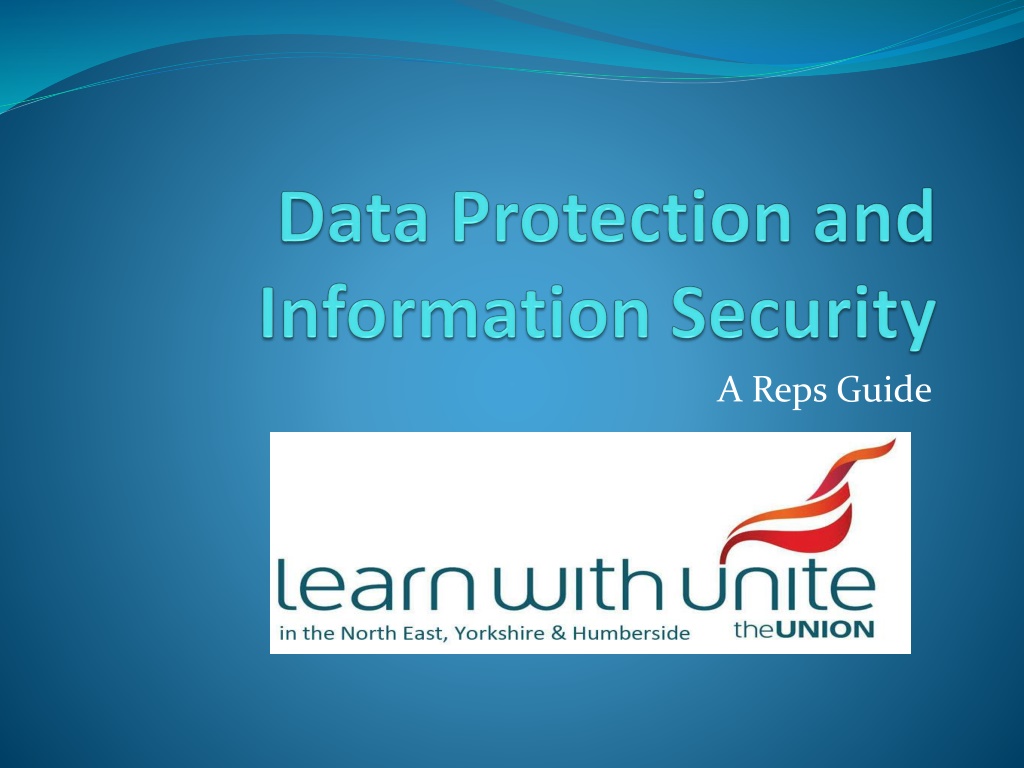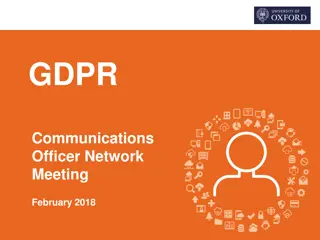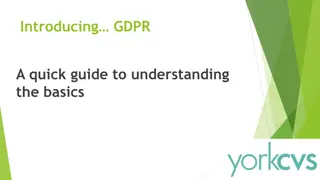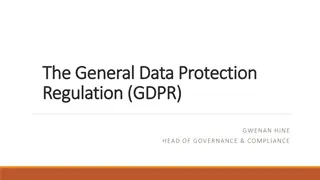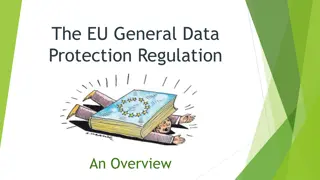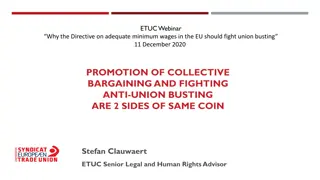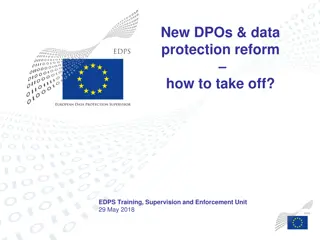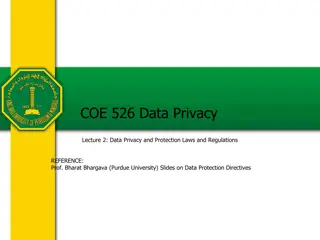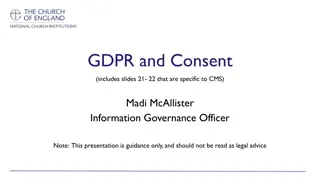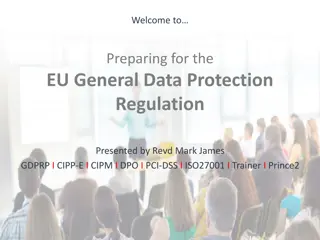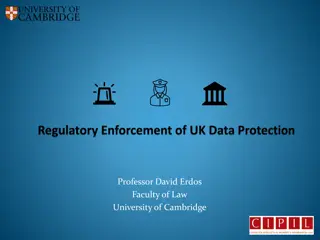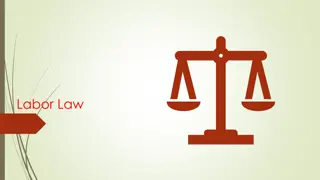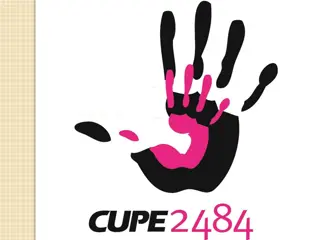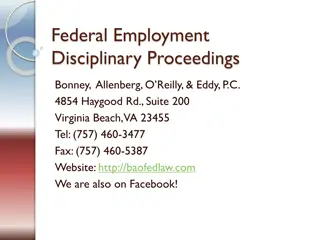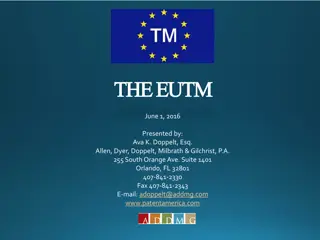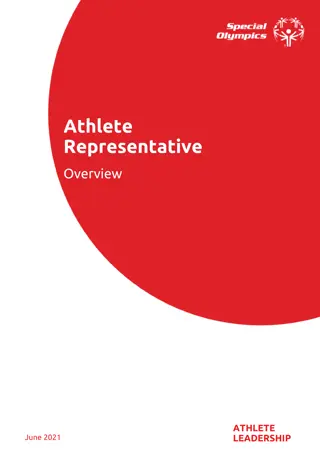Understanding GDPR for Union Representatives
This guide provides essential information for workplace representatives handling personal data about members. It explains the importance of protecting and securing information, outlines the changes brought about by GDPR, covers the types of information covered, activities affected, examples of processing personal data, and tips for preparing for GDPR compliance within unions.
Download Presentation

Please find below an Image/Link to download the presentation.
The content on the website is provided AS IS for your information and personal use only. It may not be sold, licensed, or shared on other websites without obtaining consent from the author. Download presentation by click this link. If you encounter any issues during the download, it is possible that the publisher has removed the file from their server.
E N D
Presentation Transcript
Whats it all about? Workplace reps may handle personal information about members, for example Member contact details Personal case correspondence and documents Membership lists As a union rep it s important that you take steps to protect that information and keep it secure GDPR is bringing in important changes to the rules from 25 May 2018
Whats changing? Overall, GDPR rules about protecting privacy are stricter There are some enhanced protections for individuals such as stronger subject access rights and some new rights, such as the right to be forgotten Your union will be making changes to comply with the GDPR, you may see: more detailed membership application forms or more information in privacy notices on the website
What information is covered? Any information about a living individual such as Name Job title Work department Email address Union membership number* personal data *Special categories of data have stricter rules and require extra care Special categories include information about an individual s: trade union membership or non-membership health politics
What activities are covered? What activities? Collecting and using data Disclosing it to others Storing and deleting data Processing Where? On a computer, or On paper in a filing system, or On paper intended to be put in a filing system
Processing personal data: examples Membership database on computer Personal case files in a cabinet Grievance outcome emailed to you by a member Handwritten notes from a meeting with a member If they are intended to go in the member s file Contact details on your mobile phone or laptop But probably not handwritten notes in your diary
Preparing for the GDPR Find out from your regional or full time officer what your union s data protection and information security policies are Be familiar with your union s policies, and make sure you follow them when you handle member information Be aware of the GDPR s data protection principles which set out the golden rules for handling personal information
Data protection principles: handle data fairly Follow the rules: you must only use data fairly and in line with the rules Only use member data in line with your union s policies and in particular don t share it with any third parties Take particular care with membership lists: if you have access to membership lists remember this is special category data, and take steps to protect this information
Data protection principles: collect only what you need Explain why you need it: collect data for a specific purpose For example: if you ask a member for copies of their GP letters to use for their personal case, tell them why you need the letters, what you are going to do with them, who you will send them to, what you will do with them afterwards And don t take too much: collect only the data you need for that purpose For example: do you need to keep and share all the letters from the member s GP? Are they all relevant?
Data protection principles: update and retain data appropriately Keep it up to date: data must be accurate and up to date For example: correct contact details when asked. But don t keep it forever: data must be kept for no longer than necessary For example: what is your union s guidance about how long you should keep personal case files for and where should they be held? Do you need to keep everything?
Information security Hacking: Carphone Warehouse was fined 400,000 when 3 million customer records were put at risk by a cyberattack: the company s outdated software made it vulnerable Human error: a barrister was fined 1,000 when her files were uploaded to the internet by her husband while he updated software on their home computer Passwords/encryption: the ICO criticised a lawyer whose laptop was stolen; it contained confidential information about 8 individuals which contrary to ICO guidance was not password protected.
Keeping member information secure Some issues to consider about paperwork, for home, in the workplace and on the move: Clear desk policy Files kept under lock and key Take care when travelling, laptops are more secure than paper files as they can be password protected On public transport don t leave papers or a laptop unattended and don t discuss anyone s personal information with a colleague or on the phone Don t leave papers or a laptop in your car Your union s policies: it is important to read and apply the guidance your union provides about information security, and report any breaches
Keeping member information secure Some issues to consider about computer use, for home and in the workplace: Use remote access to union system or a case management system if available Shared computers: use password protected individual user accounts Back-up issues Consider password protection of laptops/mobiles, and individual documents on devices Your union s policies: it is important to read and apply the guidance your union provides about computer and mobile devices, and report any breaches
Keeping member information secure Some issues to consider about email use, for home and in the workplace: Work email systems Home emails who has access? Double check email addresses and attachments before sending Consider password protection of sensitive documents Your union s policies: it is important to read and apply the guidance your union provides about email use
Respecting members rights Do not try to respond to subject access requests yourself: immediately pass the request to your regional or full time officer as they have a limited time to respond to the request Assist: promptly provide any information requested by your union to assist it with responding to a request, for example copies of your correspondence with a member Read your union s policies: it is important to follow the guidance your union provides about members rights in relation to their data
Key points to sum up Check: read and apply the guidance your union provides about data protection and information security Think: about your use of member data almost everything you deal with for members will be subject to the data protection rules Secure: keep all member information secure, at home, at work and on the move Report: if you receive a subject access request or in cases of loss or unauthorised use of member data, report immediately to your regional or full time officer or the union s Data Protection Officer
learnwithunite.org Visit learnwithunite.org Litmos Heroes, Short Courses and Tasters
